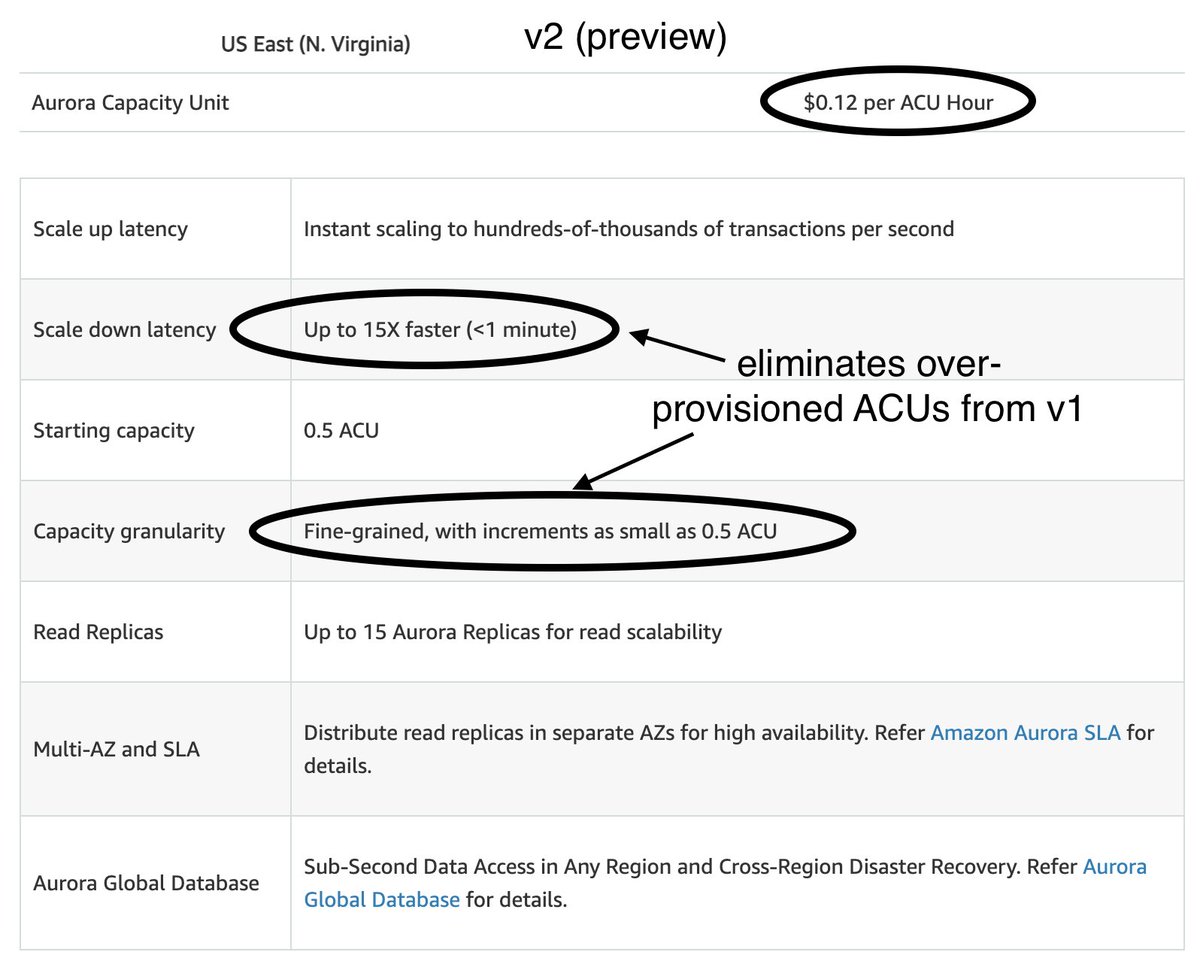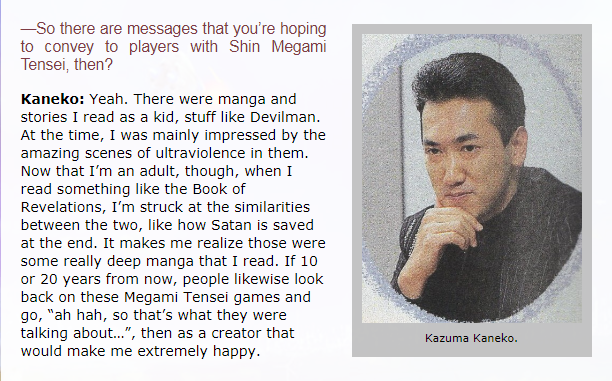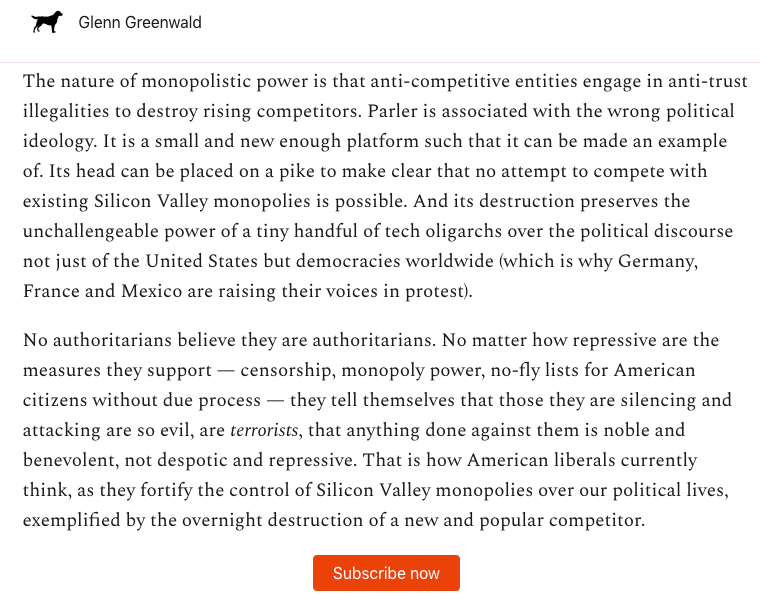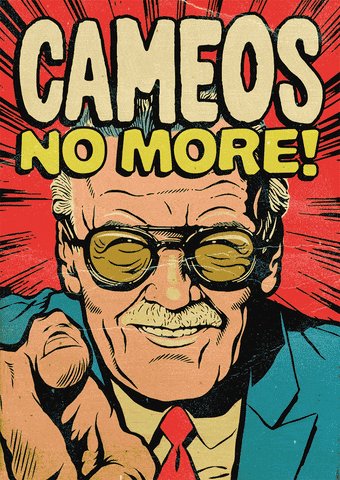A: no, it lives side-by-side with the existing Aurora Serverless, which will still be available to you as "v1".
I've gotten a few questions about Aurora Serverless v2 preview, so here's what I've learnt so far. Please feel free to chime in if I've missed anything important or got any of the facts wrong.
Alright, here goes the 🧵...
A: no, it lives side-by-side with the existing Aurora Serverless, which will still be available to you as "v1".
A: no, v2 scales up in milliseconds, during preview the max ACU is only 32 though
A: yes, unfortunately...
Q: so if you want to avoid cold starts, what's the minimum ACU you have to run?
A: minimum ACU with v2 is 0.5
A: no, it scales up in increments of 0.5 ACUs, so it's a much tighter fit for your workload, so you'll waste less money on over-provisioned ACUs
A: yes, v2 supports all the Aurora features, including those that v1 is missing, such as global database, IAM auth and Lambda triggers
A: yes, but v1 requires a lot of over-provisioning because it doubles ACU each time and takes 15 mins to scale down. v2 scales in 0.5 ACU increments and scales down in < 1 min. AND you get all the Aurora features!

A: yes you can! cool, right!?
A: yes, you probably should, until data API is enabled on v2, otherwise, more connections = more ACUs, it can run you into trouble
@jeremy_daly has written a nice summary post on this too, with a nice experiment on the scaling behaviour of v2, so check it out if you haven't already https://t.co/DIGylN0HFX
More from Software
forgive my indulgence but 2020's been a big year for @shmuplations, so here's a look back at everything that went up over the last twelve months—there's a lot of stuff I'm sure you all read & other things you'd be forgiven for missing, so let's recap (thread)
the year kicked off with shmuplations' first big video project: a subtitled translation of a 2016 NHK documentary on the 30th anniversary of Dragon Quest which features interviews with Yuji Horii, Koichi Nakamura, Akira Toriyama, and Koichi Sugiyama https://t.co/JCWA15RTlx

following DQ30 was one of the most popular articles of the year: an assortment of interviews with composers Yuzo Koshiro and Motohiro Kawashima concerning the music of Streets of Rage 1, 2 & 3 https://t.co/QUtyC9W12Z their comments on SoR3 in particular were full of gems

Game Designers: The Next Generation profiled six potential successors to the likes of Shigeru Miyamoto & Hironobu Sakaguchi, some of who you may recognise: Kazuma Kaneko, Takeshi Miyaji (1966-2011), Noboru Harada, Kan Naitou, Takashi Tokita & Ryoji Amano https://t.co/lWZU3PLvwX

from the 2010 Akumajou Dracula Best Music Collections Box, a subbed video feature on long-time Castlevania composer Michiru Yamane https://t.co/NMJe4ROozR sadly, Chiruru has since passed; Yamane wrote these albums in his honor
https://t.co/orlgPTDsKK
https://t.co/QnQl8KI9IX

the year kicked off with shmuplations' first big video project: a subtitled translation of a 2016 NHK documentary on the 30th anniversary of Dragon Quest which features interviews with Yuji Horii, Koichi Nakamura, Akira Toriyama, and Koichi Sugiyama https://t.co/JCWA15RTlx

following DQ30 was one of the most popular articles of the year: an assortment of interviews with composers Yuzo Koshiro and Motohiro Kawashima concerning the music of Streets of Rage 1, 2 & 3 https://t.co/QUtyC9W12Z their comments on SoR3 in particular were full of gems

Game Designers: The Next Generation profiled six potential successors to the likes of Shigeru Miyamoto & Hironobu Sakaguchi, some of who you may recognise: Kazuma Kaneko, Takeshi Miyaji (1966-2011), Noboru Harada, Kan Naitou, Takashi Tokita & Ryoji Amano https://t.co/lWZU3PLvwX

from the 2010 Akumajou Dracula Best Music Collections Box, a subbed video feature on long-time Castlevania composer Michiru Yamane https://t.co/NMJe4ROozR sadly, Chiruru has since passed; Yamane wrote these albums in his honor
https://t.co/orlgPTDsKK
https://t.co/QnQl8KI9IX

How Silicon Valley, in a Show of Monopolistic Force, Destroyed
In the last three months, tech giants have censored political speech and journalism to manipulate U.S. politics -- banning reporting on the Bidens, removing the President, destroying a new competitor -- while US liberals, with virtual unanimity, have cheered.
The ACLU said the unity of Silicon Valley monopoly power to destroy Parler was deeply troubling. Leaders from Germany, France and Mexico protested. Only US liberals support it, because the dominant strain of US liberalism is not economic socialism but political authoritarianism.
https://t.co/qD9OdwlPbV

Just three months ago, a Dem-led House Committee issued a major report warning of the dangers of the anti-trust power of Apple, Amazon, Google and Facebook. Left-wing scholars have been sounding the alarm for years. Now it's here, and liberals
In the last three months, tech giants have censored political speech and journalism to manipulate U.S. politics -- banning reporting on the Bidens, removing the President, destroying a new competitor -- while US liberals, with virtual unanimity, have cheered.
The ACLU said the unity of Silicon Valley monopoly power to destroy Parler was deeply troubling. Leaders from Germany, France and Mexico protested. Only US liberals support it, because the dominant strain of US liberalism is not economic socialism but political authoritarianism.
https://t.co/qD9OdwlPbV

Just three months ago, a Dem-led House Committee issued a major report warning of the dangers of the anti-trust power of Apple, Amazon, Google and Facebook. Left-wing scholars have been sounding the alarm for years. Now it's here, and liberals
We wrote a 200 page report on why corporate concentration - including the big tech radicalization engines - worsened under both Democratic and Republican administrations. It has to do with antitrust enforcement, and it's fixable by Biden. https://t.co/K85Kv34t83
— Matt Stoller (@matthewstoller) January 12, 2021
The Great Software Stagnation is real, but we have to understand it to fight it. The CAUSE of the TGSS is not "teh interwebs". The cause is the "direct manipulation" paradigm : the "worst idea in computer science" \1
Progress in CS comes from discovering ever more abstract and expressive languages to tell the computer to do something. But replacing "tell the computer to do something in language" with "do it yourself using these gestures" halts that progress. \2
Stagnation started in the 1970s after the first GUIs were invented. Every genre of software that gives users a "friendly" GUI interface, effectively freezes progress at that level of abstraction / expressivity. Because we can never abandon old direct manipulation metaphors \3
The 1990s were simply the point when most people in the world finally got access to a personal computer with a GUI. So that's where we see most of the ideas frozen. \4
It's no surprise that the improvements @jonathoda cites, that are still taking place are improvements in textual representation : \5
The Great Software\xa0Stagnation https://t.co/A6peSPERaU
— Jonathan Edwards (@jonathoda) January 1, 2021
Progress in CS comes from discovering ever more abstract and expressive languages to tell the computer to do something. But replacing "tell the computer to do something in language" with "do it yourself using these gestures" halts that progress. \2
Stagnation started in the 1970s after the first GUIs were invented. Every genre of software that gives users a "friendly" GUI interface, effectively freezes progress at that level of abstraction / expressivity. Because we can never abandon old direct manipulation metaphors \3
The 1990s were simply the point when most people in the world finally got access to a personal computer with a GUI. So that's where we see most of the ideas frozen. \4
It's no surprise that the improvements @jonathoda cites, that are still taking place are improvements in textual representation : \5
You May Also Like
"I really want to break into Product Management"
make products.
"If only someone would tell me how I can get a startup to notice me."
Make Products.
"I guess it's impossible and I'll never break into the industry."
MAKE PRODUCTS.
Courtesy of @edbrisson's wonderful thread on breaking into comics – https://t.co/TgNblNSCBj – here is why the same applies to Product Management, too.
There is no better way of learning the craft of product, or proving your potential to employers, than just doing it.
You do not need anybody's permission. We don't have diplomas, nor doctorates. We can barely agree on a single standard of what a Product Manager is supposed to do.
But – there is at least one blindingly obvious industry consensus – a Product Manager makes Products.
And they don't need to be kept at the exact right temperature, given endless resource, or carefully protected in order to do this.
They find their own way.
make products.
"If only someone would tell me how I can get a startup to notice me."
Make Products.
"I guess it's impossible and I'll never break into the industry."
MAKE PRODUCTS.
Courtesy of @edbrisson's wonderful thread on breaking into comics – https://t.co/TgNblNSCBj – here is why the same applies to Product Management, too.
"I really want to break into comics"
— Ed Brisson (@edbrisson) December 4, 2018
make comics.
"If only someone would tell me how I can get an editor to notice me."
Make Comics.
"I guess it's impossible and I'll never break into the industry."
MAKE COMICS.
There is no better way of learning the craft of product, or proving your potential to employers, than just doing it.
You do not need anybody's permission. We don't have diplomas, nor doctorates. We can barely agree on a single standard of what a Product Manager is supposed to do.
But – there is at least one blindingly obvious industry consensus – a Product Manager makes Products.
And they don't need to be kept at the exact right temperature, given endless resource, or carefully protected in order to do this.
They find their own way.




























